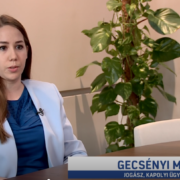New Money-Laundering Prevention Policy Templates are Available from The National Bank of Hungary
Due to changes in the Prevention and Combating of Money Laundering and Terrorist Financing Act earlier this year, the policy templates and guidelines have changed
The National Bank of Hungary (MNB) updated its Money Laundering and Terrorist Financing Prevention Policy Templates and its Guidelines, designed to assist companies under the effect of the Act on Money Laundering (primarily those operating in the money and capital markets) with legal compliance.
Major amendments to the Act on Money Laundering (Act LIII of 2017 on the Prevention and Combating of Money Laundering and Terrorist Financing) entered into force on the 10th of January 2020. Most notably, they extend the scope of the Act to new services and providers of services:
- a provider of exchange services between virtual and legal currencies and virtual currency exchange services;
- depositary wallet providers;
- a service provider dealing in or selling cultural goods (art, antiques) in respect of transactions or series of transactions the value of which is equal to or greater than HUF 3,000,000;
- service providers engaged in the storage or trading of cultural goods (art, antiques) in free ports or those acting as intermediaries in free ports for transactions or series of transactions the value of which is equal to or greater than HUF 3,000,000; and
- registered office service providers.
The Act also applies to a service provider – irrespective of where its headquarter is registered – which offers its services through a permanent business establishment in Hungary – which includes a branch – directly with the services specified in the Act on Money Laundering.
With respect to services, in case of the commercial leasing of real estate, only rental fees exceeding HUF 500,000 per transaction are subject to the law. Similarly, in the case of a brokerage service provided by a real estate agent, the extension applies only to the commercial mediation of the transfer of ownership of real property. The obligations of investment fund managers to prevent money laundering are extended with regards to their activities as defined in the Investment Services Act (Act CXXXVIII of 2007 on Investment Firms and Commodity Dealers, and on the Regulations Governing their Activities). The law imposes provisions on the amount of money exchanged in foreign exchange offices: transactions with a value of HUF 100,000 or more for one client within one week, are now subject to the law.
The rules on customer due diligence changed significantly. New regulations demand service providers to classify customers based on risk assessment, expand the line of customers subject to more stringent due diligence procedures with politically exposed persons and tighten the rules of procedure. Service providers with high risk, third-country clients with strategic deficiencies must comply with new standards in terms of customer identification (the most important of which is the establishment of business relationships, the execution of a transaction order subject to management approval under internal regulations). A new chapter – Special Customer Due Diligence – was added to the legislation, primarily concerning credit institutions, financial service providers and electronic money issuers. The limits of transaction orders set by laws changed. Service providers are required to perform due diligence when executing a transaction order in excess of HUF 4,500,000, the merchant must perform due diligence when a transaction exceeding HUF 3,000,000 is performed using cash, and due diligence must be conducted on any currency exchange amounting to at least HUF 300,000. The scope of the documents which may certify the source of money or property has been defined in the regulations.
Further changes to the law will take effect on October 1 and December 1, 2020, including the so-called provisions on changes in the level of risk, new reporting obligations on beneficial owners (to be filed in a central registry), and reporting obligations on bank accounts and safes.
Policy Templates
In line with its previous practices, MNB prepared sample model policies for trust service providers, and supports the compliance of service providers subject to the Act on Money Laundering with the help of the internal regulations. The most recent policy templates were published on the website on the 30th of March 2020: https://www.mnb.hu/felugyelet/szabalyozas/penzmosas-ellen/szabalyzatok-segedletek
Internal policies are required to comply with the new requirements by April 9, 2020, in line with the Act on Money Laundering, regardless of the date of publishing of regulatory samples.
Assignment of a Legal Adviser
For service providers who only recently became affected by new laws, or who do not have sufficient resources to ensure compliance with the law, it is strongly recommended that they consider utilising the services of legal advisers.
- Kapolyi Law Firm, the preeminent Hungarian capital markets law firm, with over two decades of expertise, fully supports the development of internal policies and the adaptation of existing policies the to new requirements.
- Kapolyi Law Firm has extensive experience in drafting internal policies to comply with laws on the prevention of money laundering and terrorist financing.
If you have further questions about money laundering and terrorist financing prevention, please do not hesitate to contact one of our experts.









